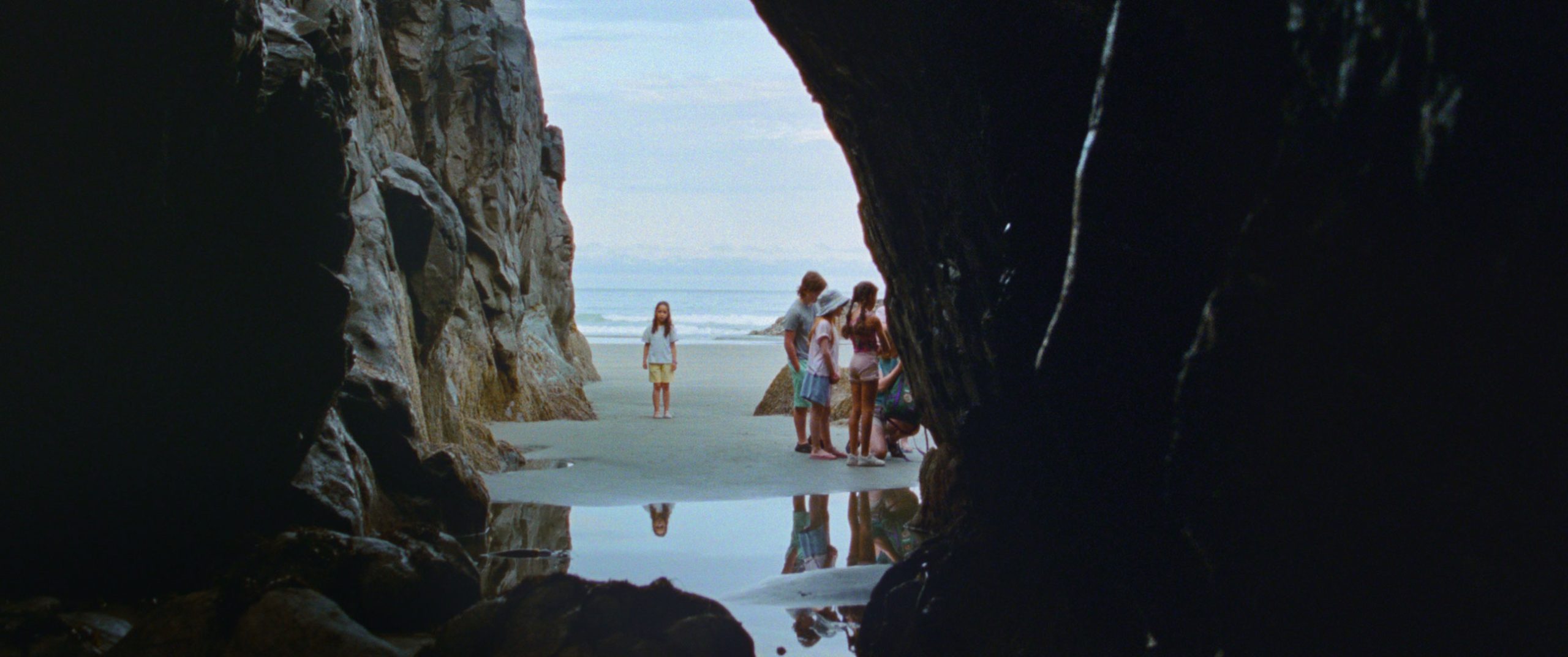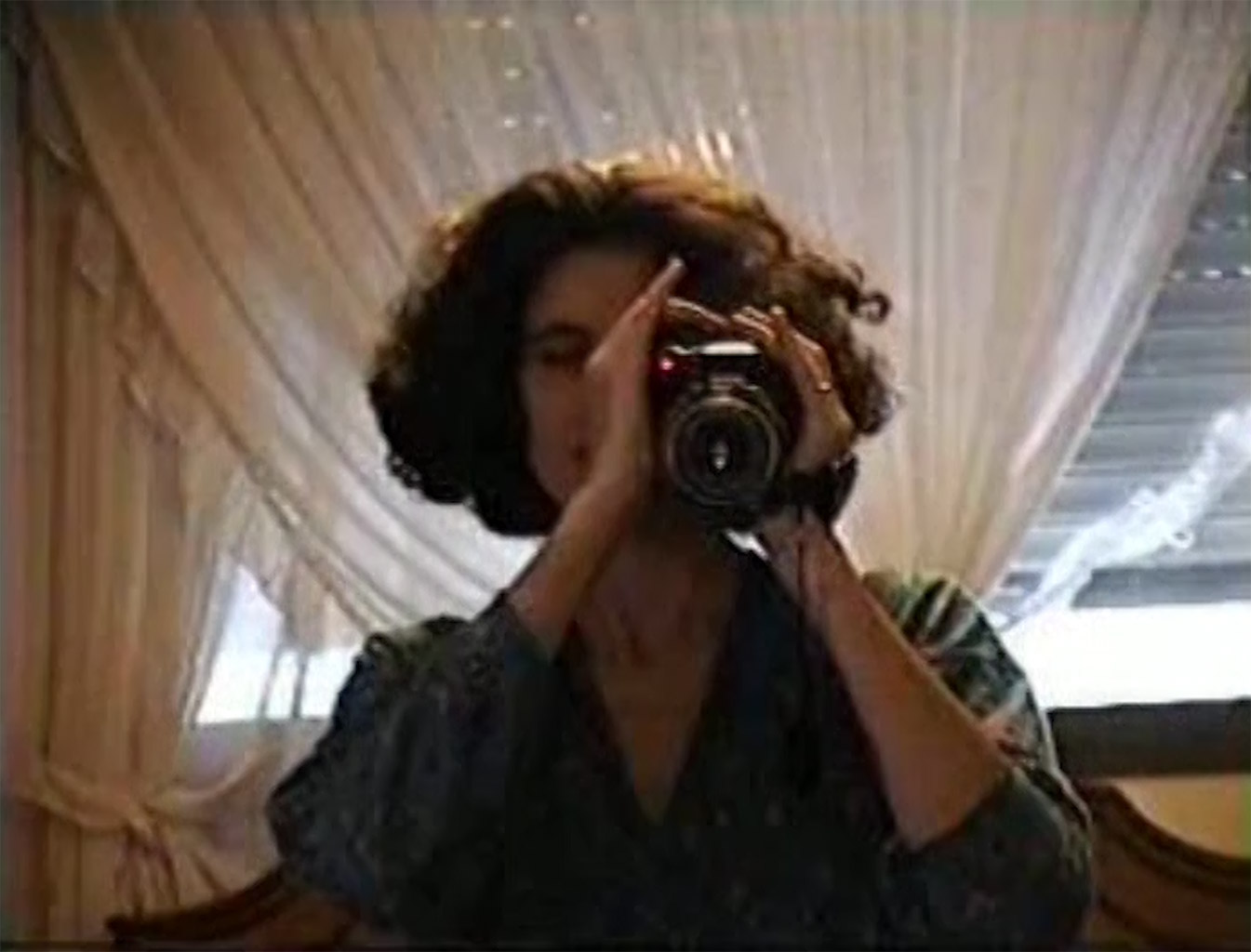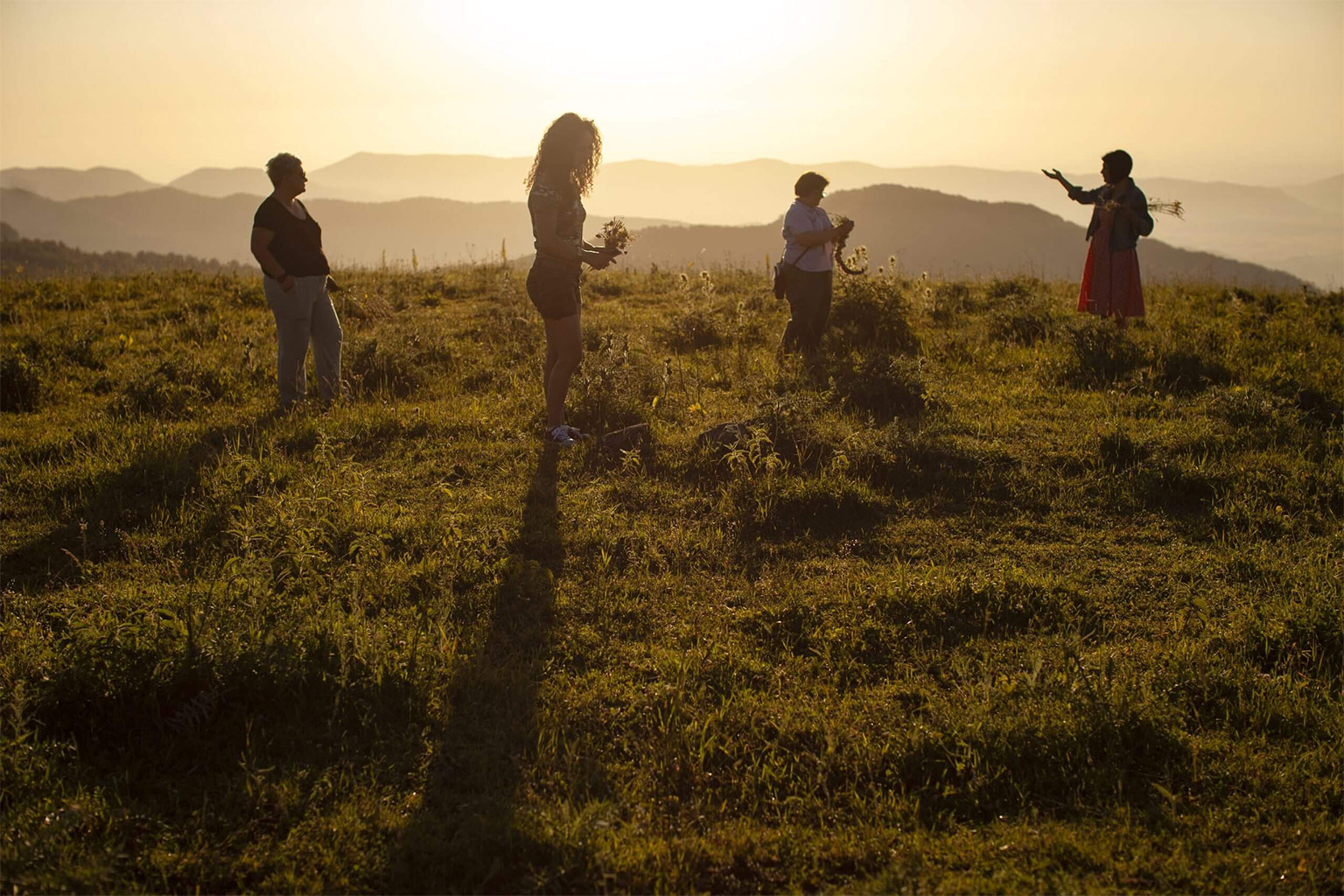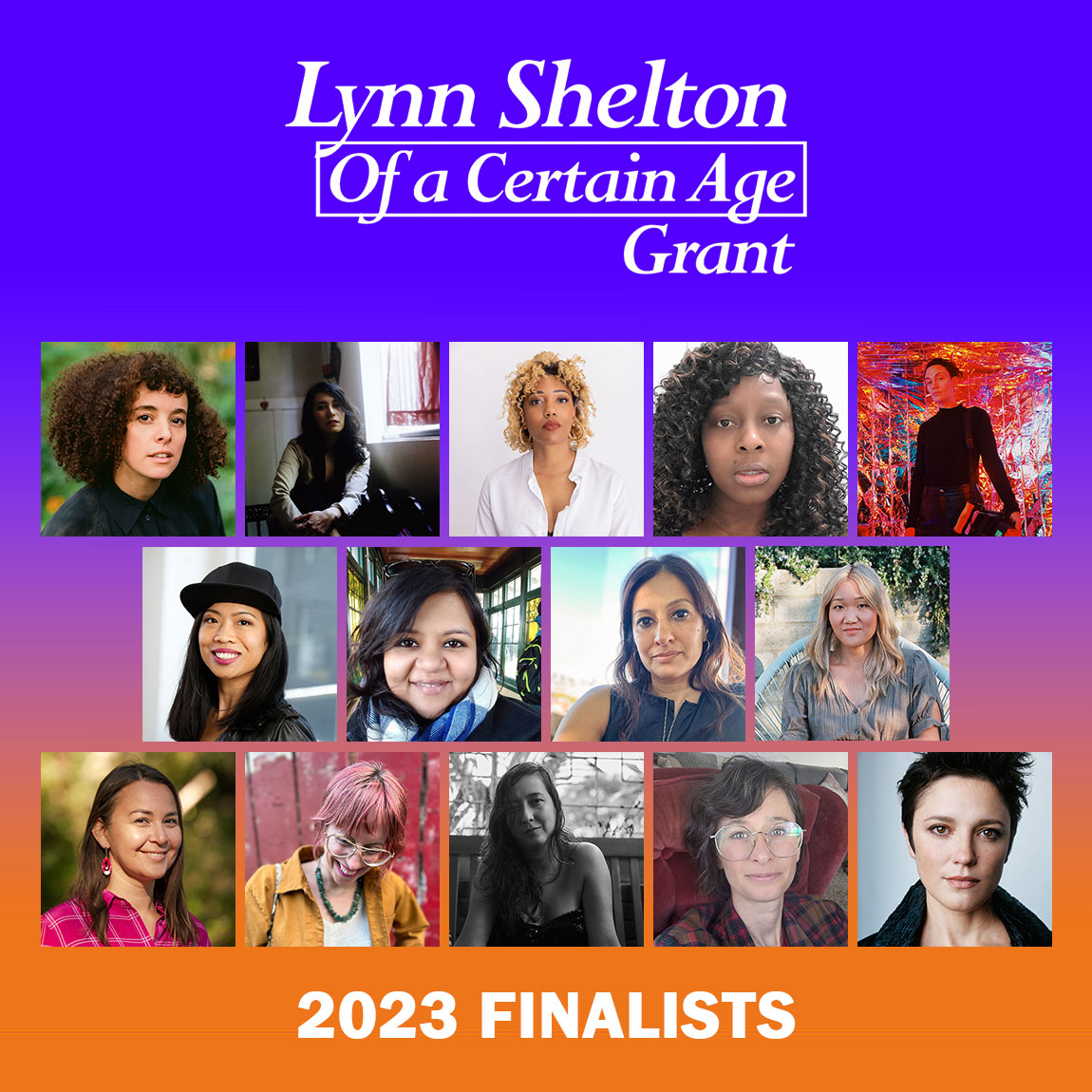
Learn about this year’s fourteen finalists in the article below. The final recipient will be announced by Northwest Film Forum by the end of October 2023.
Past recipients have included: Guatemalan filmmaker Izabel Acevedo (2023), with El intermediario (The Middleman); Seneca-Cayuga Nation filmmaker Erica Tremblay (2021), with Fancy Dance; and Caribbean sci-fi filmmaker Keisha Rae Witherspoon (2020), with Untitled Opa-locka Project.
- Brooke Swaney
- Charlotte Glynn
- Claudia Calderón
- Emily Ray Reese
- Erin Li
- Kelsey Siepser
- Keshni Kashyap
- Malika Zouhali-Worrall
- Masami Kawai
- McKenzie Chinn
- Mirta Desir
- Ro Haber
- Sushma Khadepaun
- Tiffany Frances
BROOKE SWANEY

Blackfeet and Salish filmmaker Brooke Swaney’s untitled feature-in-progress is a road film. After a tribal cop’s cousin is attacked by white nationalists, the two take a cross-country journey to deliver traditional justice through “banishment” – meeting other Indigenous communities along the way which help them uncover what it means to deliver traditional justice, as opposed to following Western methods.
The event is based off real-life experiences. During the summer of 2020, Swaney recalls receiving a call from a Blackfeet cousin and friend who had gone down to support Black Lives Matter demonstrators in downtown Missoula. “He was savagely and senselessly attacked, spent a day and night in the hospital, and called to share and process the assault,” she says. “I tried to help him through my position at the ACLU at the time. A story then began to percolate as I pondered: how can we get justice for him? What could we do if we looked toward Indigenous justice practices?”
While she began the writing process for the film, Swaney learned about the death of a young Indigenous woman, Mika Westwolf, on her reservation.
“You can’t make this shit up,” Swaney says. “The woman who hit her and left her to die on the side of the road had her two children in the back of her truck; their names [were] Aryan and Nation… Has the county prosecuted her? No. The injustice that surrounds me is palpable and infuriating, and humor is a real coping mechanism for all of us.”
Reflecting on her experiences in NYU’s graduate film program, Swaney stresses the continued importance of Indigenous voices in filmmaking. “I encountered a lot of, ‘Well, who is interested in hearing stories about Native people?’, ‘Where’s the audience?’, ‘Who cares?'” she says. “This apathy and lack of vision of the values of our stories (and also, oddly, the certain type of narrative), held me back. However, it was through my own community that I have found the support to continue to move forward with my dream of working as a writer/director in the industry.”
Swaney’s project is currently undergoing a major script rewrite, and she is actively seeking other co-conspirators. While she has worked extensively in non-fiction in recent years, this project marks an attempt to get back into fiction works. She works and lives on her ancestral homelands.
CHARLOTTE GLYNN
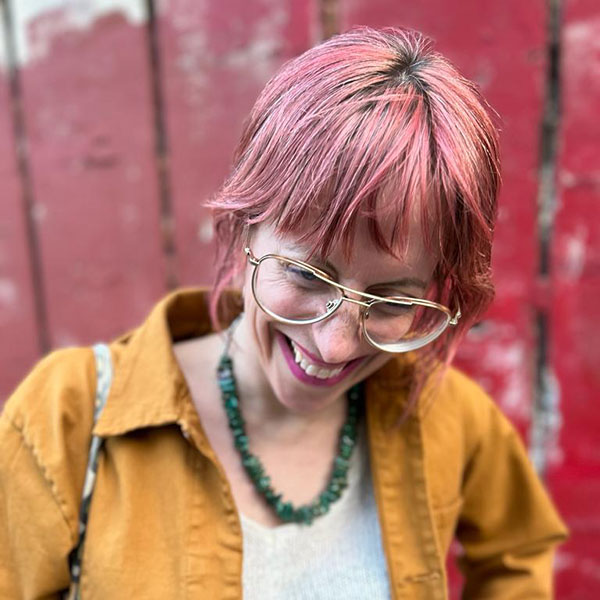
Documentary and fiction filmmaker Charlotte Glynn is set to film The Gymnast right after Thanksgiving this year, following recent approval from SAG-AFTRA, since their project is union but has a relatively small budget.
Set in Pittsburgh, Pennsylvania in 1993, the film follows Monica – a 14-year-old gymnast who aspires to be an Olympian – and her “die-hard gym dad.” After Monica has a potentially career-ending injury, both she and her father are left to reconsider what gives their lives meaning. The story is inspired by Glynn’s best friend who had been a gymnast and was forced to make the decision of whether to “commit at a higher level and continue competing or quit.”
“She really struggled with the decision, but ultimately, she quit. She still knows her floor routine by heart,” Glynn shares. “It’s still so much a part of her and her identity. I have always been struck by how much that loss stayed with her.”
The Gymnast is also inspired by Glynn’s father, who she describes as “very charismatic but also violent and abusive.” Through the film, she hopes to explore the duality of how, growing up, he was both a “caring father” and also a misogynist to her mother and other people he dated. Similarly, though Glynn herself wasn’t a gymnast, she sees her own story in Monica’s.
“Her struggles to understand who she is once the world around her starts to sexualize her – that’s all based on my experience coming of age,” Glynn explains. “Why now? Because we are having conversations about consent and what empowerment really looks like, and The Gymnast is a story about a teenage girl trying to navigate a world of people telling her who she should be. It’s about a teenage girl figuring out how to make choices based on what she wants.”
CLAUDIA CALDERÓN
Based off Puerto Rican filmmaker Claudia Calderón’s difficulties getting a foothold as a director early in her career, Gracias, vuelva pronto tells the story of Amalia, a tour guide who is “in the throes of a mid-life crisis.” After an accident at work leaves Amalia unemployed, she is forced to reevaluate her life and face uncertainties, in a film that shows how the Puerto Rico’s relationship with tourism, colonization, gentrification, and stereotypical definitions of paradise affects everyday lives. Throughout the film is a tinge of joyful anger, as the main character “tries to regain her autonomy in one of the world’s last colonies, Puerto Rico, a charming island she no longer finds so endearing.”
Though Calderón now has screened work internationally, has created a number of music videos, and has even made concert footage for artists like Bad Bunny, Calderón recalls how difficult it was for her to establish herself as “new talent on the Island.” After facing many challenges, she had placed her dreams of directing on indefinite hiatus and began to process her “personal sense of stagnation.”
Amalia was created in that time – a character that is highly personal to Calderón. Amalia “caters to tourists as her form of income [and] eventually turns her character into an armor to hide the confusion and frustration of wanting to do something else with her life, without being exactly sure what,” Calderón explains.
With Gracias, vuelva pronto — which translates loosely to, Thanks, come back soon — Calderón finds a sense of urgency to share her voice and contribute to a more diverse filmmaking community. Recognizing the lack of funding and resources available to Puerto Rican filmmakers, Pacheco adds, “I find it very important to put the spotlight on the Puerto Rican reality, since it is very rich in contradictions and complexities given its relationship with the U.S. I also feel that there are few stories that exist in film about us from our islander point of view.”
EMILY RAY REESE
Emily Ray Reese’s feature film, Guadalupe Mountain, embraces magical realism as it follows a young girl’s journey in the mountains of New Mexico, where she tries to “gain her parents’ affection by becoming a barrel racer, but then must summon her magical powers with nature to escape the sexual advances of her coach.”
The story was inspired by Reese’s “desire to use magical realism to visually pull my audience into the emotional experience of being sexually groomed.” She explains, “Because children naturally use their imaginations to process their experiences, I wanted to explore a child’s inner world through fantasy and magic to externalize the internal experiences of my main character.”
Guadalupe Mountain draws from Reese’s own experience; she was abused by a family friend between the ages of five and seven, but she kept quiet due to her shame and fears of losing those important. It was only when the #MeToo movement transpired that she realized the prevalence of sexual abuse – but the fact that it “largely left child victims out of the conversation” inspired her to create a piece of work “so people and kids who have experienced childhood sexual abuse know they are not alone and it’s not their fault.”
“This story takes place in the unique world of Northern New Mexico, where I was raised,” explains Reese, hinting at the rural American stories she often creates work bout. “The interplays of Latino, hunter, and rodeo culture make this story provide a rich and underrepresented perspective in cinema.”
Reese is currently looking to attach a team to the project and to create a short film proof-of-concept.
ERIN LI
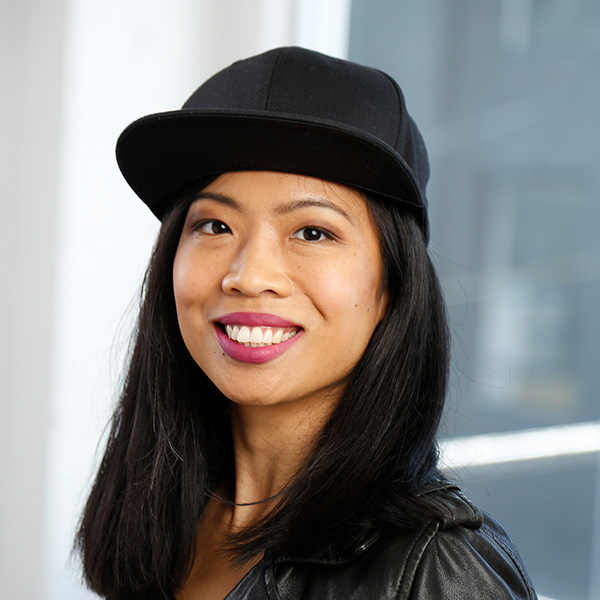
Second-generation Asian American writer and director Erin Li explores mortality in her as-of-yet-untitled sci-fi feature film. A drama with dark comedic moments, the project centers around a woman who decides to end her life but is helped by three unlikely guides along the way.
“We tend to avoid discussing our own mortality in the U.S., to the point where Silicon Valley tech companies are attempting to “cure” death with biohacking and a merger of humans, AI, and robots,” comments Li. “However, the more we avoid something, the scarier it becomes, until it looms so large that we can’t even see or make sense of it. I want to explore death from another angle – through a heightened, absurdist, surreal, sci-fi lens.”
Li jokes a grant like the Lynn Shelton Of a Certain Age grant would help her “make this film before AI does.”
KELSEY SIEPSER

“My work focuses on mental illness and how traditional gender roles can twist, damage and destroy women,” explains multi-hyphenate Los Angeles-based artist Kelsey Siepser, who creates through a queer, Jewish, and Feminist lens.
“In 2021, I suffered a miscarriage at 10 weeks and felt woefully underprepared for the unique, liminal grief of pregnancy loss,” she continues. “I found myself wondering why I hadn’t seen more stories centering this experience. When I surfaced from my grief, I adapted a short play I had written into a film that shared my story through the lens of film. That was the seed of the current feature film in development.”
With a work-in-progress title of In Her Ear, this feature film follows a pregnant woman after she moves to Buenos Aires, and an insect crawls into her ear. While there, she loses her pregnancy and discovers that her husband is not who she thought he was; she soon finds her relationship to her Jewish heritage in conflict with her loyalties to her husband’s family, which prompt her to find ways to stop a cycle of hate.
“I am interested in challenging the ways pregnancy has been portrayed and looking at how the cycle of violence is perpetuated, specifically by attempting to control women’s bodies, on a small and large scale,” Siepser explains.
They are currently finalizing the script and planning to enter pre-production next year.
KESHNI KASHYAP
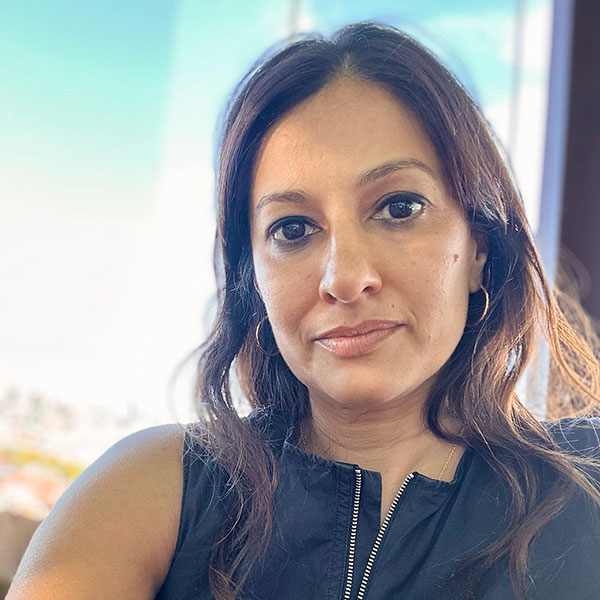
Keshni Kashyap’s upcoming film, The Lie, is based off of a true story – and actual lie – that happened in her community.
“As an Indian American, it’s always struck me how our community places great emphasis on reputation and ‘face,’ and how this can fly in the face of American culture and individualism…” says Kashyap, who has already created a play version of this work. “I wanted to write a nuanced exploration of lies, truth and reputation within a culturally conservative milieu. It is also a chance to direct a juicy, thrilling family drama, set in a world I know in and out.”
The Lie is about Pia Kohli, a failing former literary star, who attends her sister’s shotgun wedding only to learn that her family is lying to their friends about the fact that her sister is pregnant. Tense family dynamics are further explored when Pia disrupts the wedding by revealing a bigger lie, which uncovers a deep family trauma.
“I have always been strongly interested in writing personal stories and family dramas set in immigrant enclaves – especially my community, which has such a rich history of immigration and a unique place in America. There hasn’t always been an audience for these types of stories, but in the last 10 years, the landscape has really evolved. This shift dovetailed with my own artistic development,” explains Kashyap, who is also TV writer and author. “Directing a first feature after having been a working writer for a long time has allowed me to refine my ideas and bring a wealth of craft-building and life experience. It really thrills me to tell a story that will be as specific as it is universal.”
MALIKA ZOUHALI-WORRALL
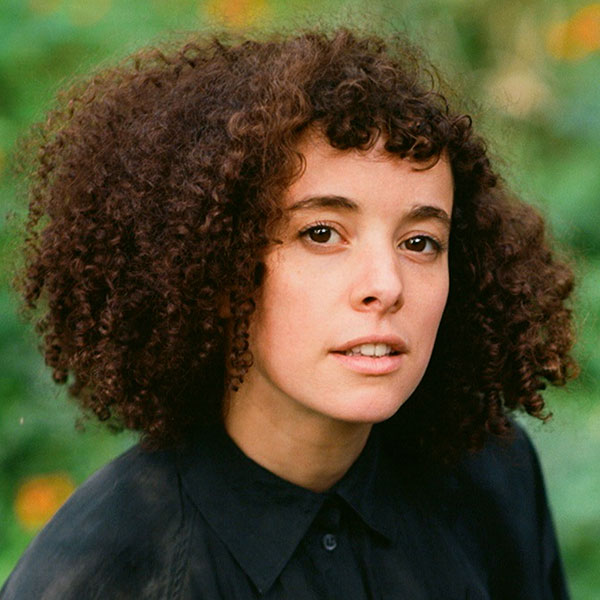
Inspired by the “brilliantly surreal, absurdist, and occasionally psychedelic prose” of Egyptian novelist Ahmed Naji, the upcoming feature film of New York-based British-Moroccan filmmaker Malika Zouhali-Worrall draws upon the Arabic literature she grew up with – but has found shockingly absent in Western literary canons.
Regarding the plot of Untitled Dystopia Film, Zouhali-Worrall describes, “Ahmed Naji, an Egyptian dystopian novelist in exile in the U.S., is watching the rehearsal of a theater play about his time in prison, where the onstage ‘Ahmed’ is writing a novel about disenchanted revolutionary Farah, who has healing powers but is unable to heal herself. Untitled Dystopia Film unfurls to reveal stories within stories in this metaphysical, hybrid film that explores how art can expand our understanding of what’s possible.”
As an “avid reader and watcher of speculative fiction since childhood,” Zouhali-Worrall is especially excited to bring this script to life. Growing up, she had only seen her white European side represented in the genre she loved and has since longed for more. For over the past three years, Zouhali-Worrall has been working with Naji to create Untitled Dystopia Film from a bilingual point of view. The most significant scripted portion of the film draws from Rotten Evidence, Naji’s book of prison essays – and they have already begun filming the documentary portions of the hybrid film.
“The film reflects on the tragic experience of such youthful exile and migration, now so common across the Arabic-speaking world, while also creating a cinematic texture that amplifies the vibrant culture – from literature to music to art to slang – that has emerged from this Revolutionary generation,” the filmmaker explains.
Zouhali-Worrall has received substantial support for the film from Sundance, San Francisco Film Society and Cinereach, among others, and is currently in the process of attaching financing partners and casting.
MASAMI KAWAI
instagram + facebook + twitter + website

A Los Angeles-born filmmaker of Ryukyuan descent, Masami Kawai is exploring a feature film that infuses her own global Indigenous perspective with the experiences of other Indigenous groups.
“The initial impetus came after moving to Oregon in 2014. I saw an abandoned TV/VCR in an empty field. It made me think of a piece my artist father had created: an installation in which the light from a TV set illuminated an open space,” Kawai recalls. “Then, I thought about the journey this TV set might have taken – perhaps passing through any number of owners.”
In Valley of the Tall Grass, a TV/VCR combo set is thrown out in an Oregon town, but “survives and circulates through the lives of various indigenous characters of color who have found themselves on Kalapuya land.” Among the characters in the ensemble piece are young sisters, an artist, a junkyard scrapper, and his skater daughter; all find their own points of connection through the object.
After putting Valley of the Tall Grass on the backburner for quite some time, Kawai returned to it during the pandemic and realized she needed to infuse her own heritage into the script.
“I’m Indigenous, and my people are Ryukyuan, from the island of Amami,” she explains. “These two statements weren’t always easy for me to make, but this project helped me claim my Indigenous voice. This personal connection extends to a commitment to building alliances with other Indigenous people. I want to make visible characters and families like mine while also creating a film that values the connections among Indigenous groups in Oregon, where I live, and have built meaningful relationships that influence this project.”
Kawai plans to lock the film’s script by fall 2023 and plans to shoot in summer 2024 in Oregon’s Eugene or Springfield area. It has already received support through the Sundance and Directing Labs, and she plans to focus much of her energy on casting a Mixtec immigrant and Cayuse characters with intention.
MCKENZIE CHINN

Inspired by “the ways in which Black women show up so powerfully for one another, especially when the rest of the world doesn’t,” Chicago-based director and actor McKenzie Chinn’s upcoming feature film, A Real One, uplifts the dynamic of two teen friends with an “us against the world”-type friendship. But after a tightly-held secret is revealed that challenges their friendship, the duo must still learn how to count on each other.
“This dynamic isn’t often reflected in mainstream media, and I wanted to honor the various, unexpected, and beautiful ways in which my relationships with other Black women in my life have truly saved me on countless occasions,” says Chinn. “I also love a coming-of-age story, and find endless inspiration in the ways that young people so often falter in their journeys but lean on one another to find a way forward.”
A Real One takes direct inspiration from the friendships Chinn held from a young age, and from the teens she works in Chicago, in her role as an arts educator.
“So many of us hold a part, or sometimes all, of Lauren and Keisha’s story – secrets that have never been spoken, harm that has never been healed,” says Chinn. “I’m continually engaged in America’s long struggle toward gender and racial justice, and am driven to reflect the experience of young Black women within those narratives with all the fullness, humor, heart, and truth that I know from what I’ve seen, what I imagine, and what my own life has reflected.”
Now in the late stages of development, A Real One has received substantial support from the Sundance Screenwriters Lab and Directors Lab. It also has a short film proof-of-concept currently finishing festival rounds and is now looking for partners to bring the feature to life.
MIRTA DESIR

For her first feature, Angie, Haiti-born Haitian-American director Mirta Desir draws upon Haiti’s history and interconnectedness with voudou, as well as her love for her younger sister, who died too young. Desir describes the film as a “love letter to Latin American artists and Haiti’s oral history – a marriage of human drama and the power of Voudou.”
“Through the lens of magical realism, Angie explores the bond between sisters and the power of that bond to overcome the worst of circumstances,” Desir explains. Specifically, the film follows a young Haitian-American girl who “enters into a bargain with the spirits to protect her younger spirit from an evil that adults cannot see – until it’s too late.”
Angie is the story of a first-generation Haitian immigrant family which has ties to their ancestral homeland; it also builds upon the Desir’s history of crafting stories that examine social issues which impact children. Her short film, All the Gaps (2023), told the story about a father-daughter duo who make food deliveries out of their car, which also serves as their home; her other project, Jean & I tells “the story of a 10-year-old immigrant Haitian girl who attempts to escape both her past and her new home.”
“I aim to engage my audiences on a visceral level, so they are not just watching the stories unfold, but experiencing the feelings of my characters. Isolation from society, and the resulting psychological and emotional toll – this is a recurring theme in my work,” says Desir. “Precocious, and wise beyond their years, my protagonists are faced with tragic situations that no young girl should face alone – but do. Inspired by real people and actual events, my stories give voice to those whose voices were silenced.”
RO HABER
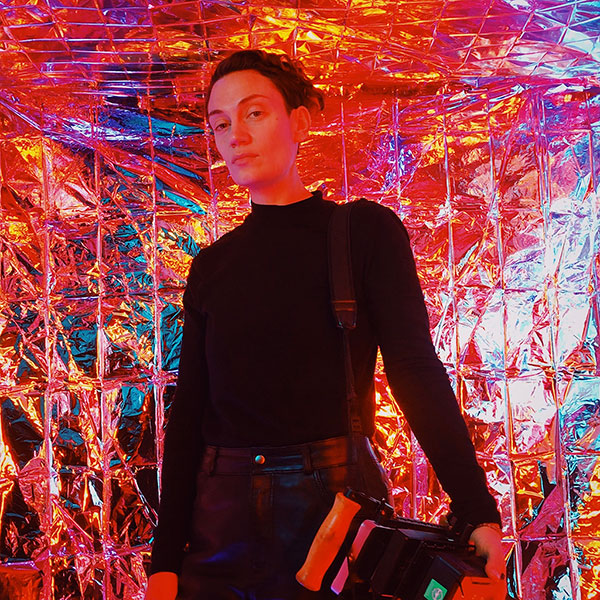
Ro Haber’s upcoming film, Shell.ai, is an elevated horror and tech thriller that explores themes of female rage and societal fears of technology, through a “modern-day retelling of the Frankenstein story with a very dangerous protagonist.”
“Shell.ai came out of a visceral experience I had working in Virtual Reality and New Media. Fresh out of the Sundance New Frontier Lab, I imagined that the world of VR and AI would be a utopian space where creators got to shape the vision of the future,” explains Haber, who describes themselves as a “horror-obsessed, aesthetically-minded” writer and director. “However, I quickly realized that new media was a lot like old media. Problematically (for our future), it was a space where mostly white men controlled who gets to tell the stories of tomorrow.”
In Shell.ai, a horror-obsessed technologist named Maya manages to win a fellowship to the Neue Institute of Technology (NIT), but following a “culture of tech-bro bullying,” decides to create an AI character that shares dark stories via Instagram. That AI is named Shell.ai – but when men start dying from the scenarios the AI shares, it’s up to Maya to figure out the source of their deaths.
The film shares aesthetic alignments with some of Haber’s favorite horror films – Raw, Under the Skin, and A Girl Walks Home Alone at Night, which all share a “predatory female gaze” – as well as their newfound interests in Artificial Intelligence. Upon realizing that most AI-centered films seem to share a male gaze, they became inspired to tell a story about AI with a feminist analysis.
Furthermore, Shell.ai is a through-and-through a proudly transgender film. As Haber explains, “There are so few films directed by trans filmmakers, let alone films directed by trans filmmakers with trans leads. Shell.ai is unique in that way. It features a brilliant transfemme lead, and is an elevated genre film. The film is inspired by my experience, and I worked with a brilliant technologist, Amelia Winger-Bearskin, to develop it and bring it to life.”
SUSHMA KHADEPAUN

With the feature film Anita, India-born New York-based filmmaker Sushma Khadepaun draws upon her own experience migrating to America – which she says simultaneously helped open up a whole new world but also resulted in a great amount of loss.
“Anita is the story of an ambitious immigrant woman from small-town India whose idea of independence is misguided because of her conservative background… the pursuit of material pleasures gets intertwined with her desire to make her place in [a patriarchal] world,” explains Khadepaun. “When her fierce pursuit of the American Dream threatens her marriage, she must confront the very life she escaped in order to achieve true independence.”
On the act of migrating to the U.S., Khadepaun reflects, “Often you get so busy assimilating in the new place that there is no time to even acknowledge this loss. You’re simply supposed to be grateful you have the opportunity to pursue the American Dream, unlike most people back home.”
Khadepaun plans to film Anita in early Spring 2024 and in the past year, has received financial support from Gotham, Film Independent, and Sundance. She is currently in the process of attaching financing partners, casting, and packaging; for the main role of Anita, her team is planning a domestic and international talent search.
TIFFANY FRANCES
instagram + facebook + twitter + website
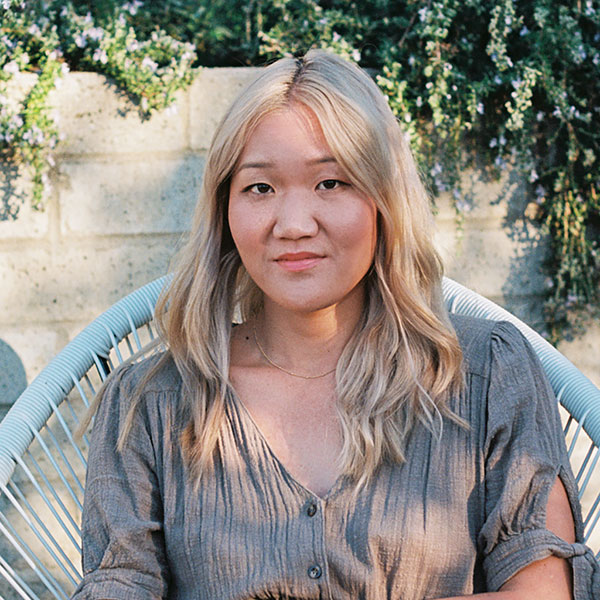
In her upcoming feature film, My Sisters, Taiwanese American narrative filmmaker Tiffany Frances examines the importance of listening to one’s gut, especially as an Asian American woman who confronts invisibility within society. The story, she describes, is about “not belonging, then discovering that truly the only person who can empower you is yourself.”
Set in the 1970s, My Sisters is the story of Olivia, a young half-Japanese American woman who joins a feminist coastal California community called The Village, in the hopes that she can connect with her biological sister, who she had fallen out of connection with.
“Her generational trauma embodies what it’s like to try to move forward from a failed system,” explains Frances. “Her rising at The Village takes her through a painful, exhilarating, complicated, emboldening journey, that leaves her to face the true idea of what inner strength means.”
My Sisters is a film that Frances says is “dreamy, mysterious, mystical, with a slight satirical undertone.” She hopes to unearth the complicated intergenerational traumas of Asian Americans using flashbacks and subconscious imagery.
“The year 1972 sets the mood for a rebellious, hallucinogenic story that’s also haunting, surreal, but also political – paralleling what we are going through today in history…” she continues. “Cinematically, this film leans into the psychedelic, consciousness-expanding, ’70s feels of the story, while visually structurally matching the inner thought process of Olivia’s journey.”
Frances explains that the longer she works in the industry, the more difficult she finds it is to listen to her own intuition. Yet she craves to make work that comes from her “authentic core,” and is constantly unlearning and learning to hear herself.
“I have always been aware that my voice has not fit the traditional mold, but looking back, I painfully question if I compromised who I was because of the systemic nature of our industry,” says Frances. “As an artist, I am ready for my work to be me and ALL of me, and this is my chance to finally do that.”





